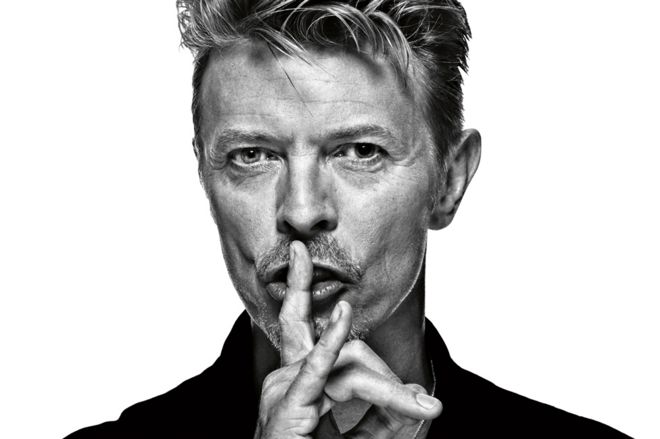 |
| The iconic album cover photo for "Heroes" taken by the brilliant Masayoshi Sukita. This cover would later be repurposed for his brilliant comeback on The Next Day in 2013. |
In honour of the 40th anniversary of Bowie's iconic "'Heroes'", I wanted to consider the fan reactions to the recently released
Filburt and
Klax remixes, the spirit of Bowie, and my personal favourite version(s) of the song. For more historical information about the creation, his official website offers this excellent
post.
On Facebook, the reactions to the remixes were less than impressed, to say the least. Here's a sampling of just a few of the comments:
Who on earth allowed this? I've just listened to it, it's awful! It's like allowing someone to draw a moustache on the Mona Lisa! Absolute sacrilege! Even without the Bowie vox, the music is very average. It really makes me stop and wonder who is now navigating Bowie's ship.
David Bowie’s music should be left alone, like The Beatles music is. Remixes of David Bowie’s music shouldn’t be allowed.
They're both shit. I often love remixes, but there is a critical difference between a "remix" and a totally unrelated piece of techno - with a different key, a different time signature, different melody, and different instrumentation - which just happens to have a Bowie vocal sample thrown randomly onto the top at the last minute. Both of these belong decisively in the latter category.
I'm not against remixes, infact some of the new T-Rex remixes are quite good, but these are absolute garbage... Why does anyone with a drum machine think they are instantly a musician / artist? These tracks don't bring anything interesting to the song or enhance it in any way... they're quite boring - now I need to go play the Bowie version just to clear my head !
Take your fingers off Bowie, never try to change, remix or what ever in his name!! His work shouldn't be allowed to be touched!!
I don't wanna even listen! Heroes is better on it's original version!
These violently opposed responses surprised me, to say the least because Bowie himself is no stranger to remixing his own work. Just look to the various remixes he did for the
Day-In Day-Out EP from
Never Let Me Down from 1987 which features three different versions of the song (not including the differing album and single version release). Or better yet, look at the
Black Tie White Noise Extras album from 1993.
There are three different remixes of the one song "Jump They Say" from the original album
Black Tie White Noise, (of which he also remixed almost every song from the album). In particular, the "
Dub Oddity" version is so different from the original piece that to play them side-by-side you'd hardly know it was the same song. The remix is almost entirely instrumental and is a fun, techno dance beat perfect for any '90s club while the original is a more "traditional" song with lyrics, a bridge, so on and so forth. This isn't even to mentioned the "Expanded Edition" albums Bowie did for the rest of the 1990s, each one featuring a handful of varying remixes that include the
Pet Shop Boys remix of "Hallo Spaceboy", which is one of the most well known.
This leads into my next point, which is that Bowie loved collaborating with fresh, innovative artists young and old. In particular, his remixes featured some of the best talent of the day like his 2013 remix of "
Love is Lost" by James Murphy from LCD Soundsystem. Moreover, it was actually this version that Bowie chose to write, shoot, and create a music video for featuring himself (and it is also my favourite incarnation of the song). So to say that allowing fresh talent to have a "crack" at one of his songs, so to speak, is actually adhering more to the spirit of Bowie and his take on his work rather than letting it be "preserved" in its original state. This can best be proven by Bowie's short-lived TAO Jones Index version of "
V-2 Schneider", which takes another classic song from the same album as "'Heroes'", but puts an extremely "techno" spin on it. He clearly wasn't opposed to "bringing his music up to date", as it were, as well as honouring the spirit of the original work.
That being said, I listened to both versions and enjoyed the Klax version the best out of the two. However, my favourite version of "Heroes" is actually not sung by Bowie at all. My favourite version is from his final musical Lazarus.
Although used as an anthem for many different heroic "acts" and moments over the decades, the fact remains that "Heroes" origins are extremely humble. The original song is famously about two lovers who Bowie observed would meet by the Berlin Wall to be together outside his studio. This was later to be his producer, Visconti, and one of Bowie's backup singers (Bowie protected their identities due to the fact that Visconti was married at the time). When I first listened to the song, although I enjoyed it well enough, I wasn't particularly moved. I recognized that the quotes around the title were ironic - a fantastic device to undercut an otherwise simplistic message about the heroism of love. To me, the song was (and is) about the heroic act of choosing to love another despite and because of the fact that life is fleeting/humanity is frail. However, the quotes offer a sly commentary on this message - is it truly heroic? Or should we choose to do this anyways, unconditionally? To choose love is not an act of heroism, but of moral obligation.
Anyways, that aside, the stripped down, toned down version of the song that Bowie approved for his musical took my breath away. The finale to his epic swansong, "Heroes" is rearranged to be a beautiful duet between Hall and Caruso. Although other reviews have called it empty because it lacks the "rock anthem" spirit of the original, I do not believe this is the case. The first time I heard this version I broke down crying because I heard the love of the Lord behind it.
First of all, the piano is chilling, the voices somber, and the overall musical arrangement is a work of brilliance. The sheer, raw emotion that the actors imbued into the lyrics was shocking. I had never heard someone sing about unconditional love and longing with such conviction. It spoke to my soul about a longing for Spiritual Truth, a desire for human connection, and above all the self-sacrificial love humanity needs (from God).
This viewpoint of the song is reflected in the plot, as the actual act of self-sacrificial love is a major point in the musical, and by Walsh's own memories of writing the musical with Bowie. He wrote:
We talked about the characters and the themes of the book. On isolation and madness and drug abuse and alcoholism and the torment of immortality. And there was a lot of talk about the beauty of unconditional love and goodness. We talked about characters finding themselves out of control - about the story sliding into a murky sadness and quick violence - about characters having drab conversations about television snacks - the everyday bending quickly and becoming Greek tragedy. The celestial and the shitty pavement. [x]
Once I was able to move past the brilliance of the new piece, I realised this version of the song was much shorter. Intrigued, I investigated further and realised that the lyrics were edited down from the original. I was so distracted by the music that I hadn't even realised the lyrics were modified, which I have transcribed below:
Newton:
I, I will be king
And you, you will be queen
Though nothing can drive them away
We can beat them, just for one day
Oh, We can be Heroes,
Just for one day
Marley: And you, you can be mean
Newton: And I, I drink all the time
Both:
'Cause we're free now, and that is a fact
Yes we're free now, and that is that
Newton:
I, I wish I could swim
Like dolphins, like dolphins can swim
Though nothing,
nothing will keep us together
We can beat them, for ever and ever
Oh we can be Heroes,
just for one day
Newton:
I, I will be king
And you, you will be queen
We're nothing,
And nothing can help us
Maybe we're lying,
then you better not stay
But we could be safer,
just for one day
Both:
We can be Heroes
We can be Heroes
We can be Heroes
We can be Heroes
Newton:
Just for one day
This new re-working was absolute genius. It eliminated what I perceived to be the "temporal constraints" of the song (ie the part about the Wall - clearly linked to late 1970s Berlin) in order to allow the more transcendental themes to shine through (the part about unconditional love). I also loved that the lines "'Cause we're lovers, and that is a fact/Yes we're lovers, and that is that" are subtly changed. Instead of "lovers" the word is replaced with "free now" - completely adding a richer spiritual undertone to the piece.
To have absolute freedom from this world is described Biblically as what Christ has given us (see:
Romans 6-8). Due to His ultimate sacrifice for us, Christ has given us the freedom to choose righteousness, to be absolved from condemnation under the Law and to be saved instead under Grace. It is His unconditional, self-sacrificial love for us that therefore gave us the ultimate freedom, and this song reflects that in its change of lyrics and new arrangement.
However, if I am "forced" to choose a version which Bowie himself sings, I have always loved his "Stage' album
version of the song. His vocals are the most impressive on that particular take, although his
appearance on Top of the Pops also gives that version a run for its money. In fact, I think that particular performance is better than the
official music video for Bowie's singing prowess, although visually the promotional short is clearly superior. Therefore, this anniversary is excellent timing with the release next week of the
A New Career In A New Town box set which covers Bowie's work from 1977-1982 (which I am eagerly awaiting).
So if you haven't already, go ahead and give "'Heroes'" another listen. Here's my Spotify playlist which rounds up all the versions (available on the platform) in one place:














